Case Study Analysis: Person-Centred Care for Dementia and Hip Injury
VerifiedAdded on 2023/01/07
|10
|3010
|71
Case Study
AI Summary
This case study examines the application of person-centred care to an elderly couple, Mr. and Mrs. T, facing health challenges including dementia and a hip injury. The case study explores the concept of person-centred care, its theoretical and ethical underpinnings, benefits, and limitations. It analyzes the practical application of person-centred care, focusing on the role of a care provider from the "Friends for Elderly" organization, and provides recommendations for improving care. The report emphasizes the importance of treating patients with dignity, respect, and compassion, incorporating their wishes into healthcare decisions, and ensuring effective communication and personalization of care. The study also delves into ethical considerations, such as maintaining privacy and respecting boundaries, and the need for care providers to possess empathy and understanding. The case highlights the significance of coordinating care, involving patients in decisions, and enabling them to lead independent lives, while also addressing the challenges and potential limitations of person-centred care in practice.
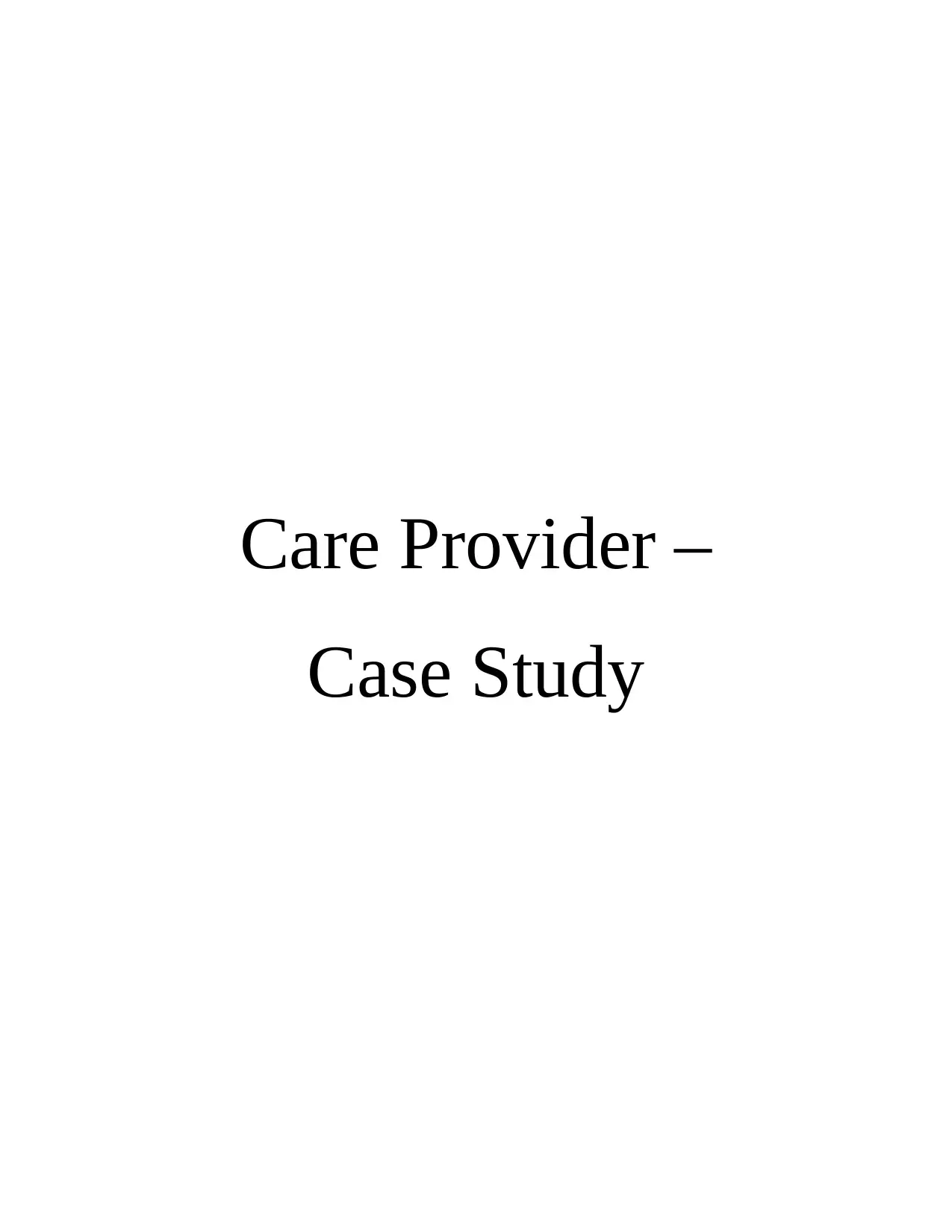
Care Provider –
Case Study
Case Study
Paraphrase This Document
Need a fresh take? Get an instant paraphrase of this document with our AI Paraphraser
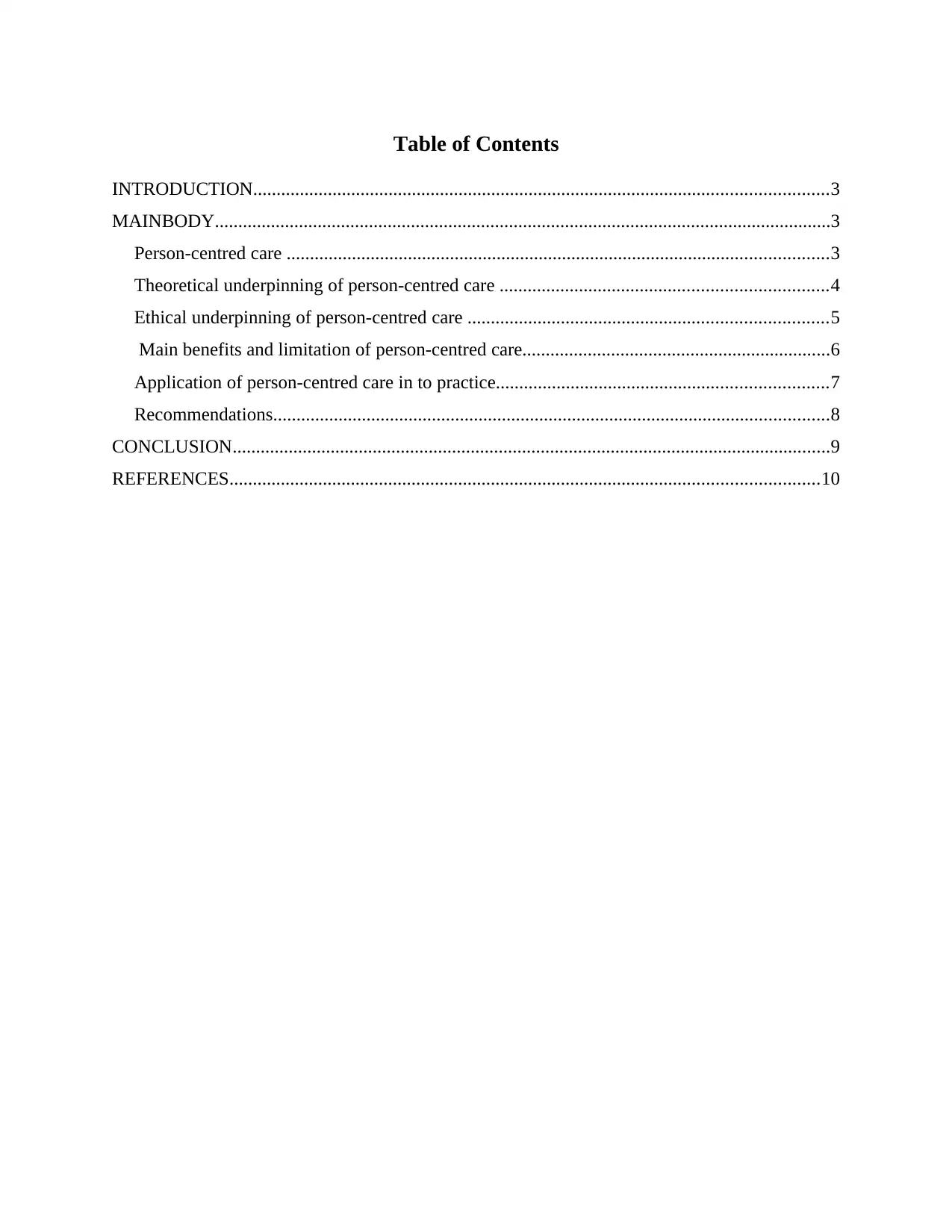
Table of Contents
INTRODUCTION...........................................................................................................................3
MAINBODY....................................................................................................................................3
Person-centred care ....................................................................................................................3
Theoretical underpinning of person-centred care ......................................................................4
Ethical underpinning of person-centred care .............................................................................5
Main benefits and limitation of person-centred care..................................................................6
Application of person-centred care in to practice.......................................................................7
Recommendations.......................................................................................................................8
CONCLUSION................................................................................................................................9
REFERENCES..............................................................................................................................10
INTRODUCTION...........................................................................................................................3
MAINBODY....................................................................................................................................3
Person-centred care ....................................................................................................................3
Theoretical underpinning of person-centred care ......................................................................4
Ethical underpinning of person-centred care .............................................................................5
Main benefits and limitation of person-centred care..................................................................6
Application of person-centred care in to practice.......................................................................7
Recommendations.......................................................................................................................8
CONCLUSION................................................................................................................................9
REFERENCES..............................................................................................................................10
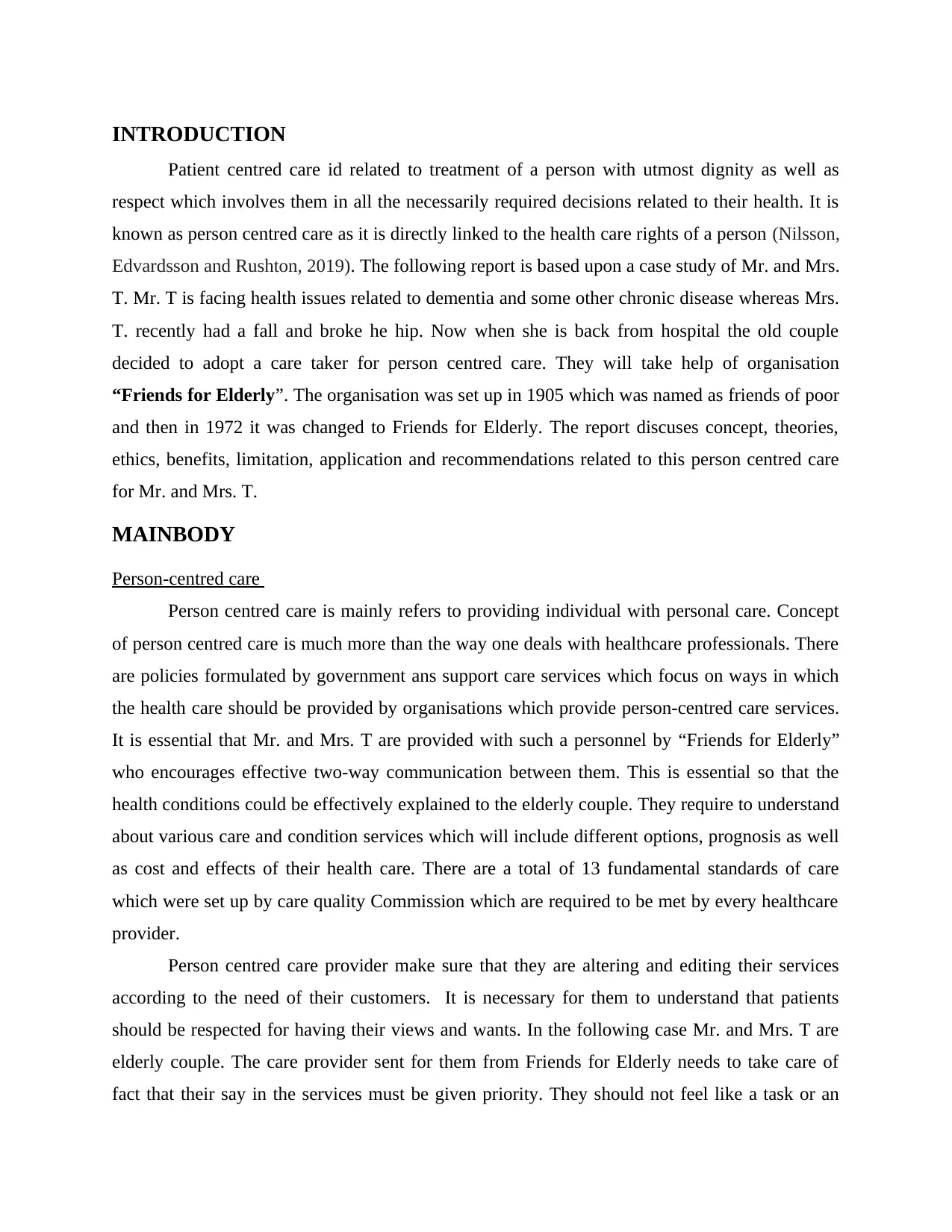
INTRODUCTION
Patient centred care id related to treatment of a person with utmost dignity as well as
respect which involves them in all the necessarily required decisions related to their health. It is
known as person centred care as it is directly linked to the health care rights of a person (Nilsson,
Edvardsson and Rushton, 2019). The following report is based upon a case study of Mr. and Mrs.
T. Mr. T is facing health issues related to dementia and some other chronic disease whereas Mrs.
T. recently had a fall and broke he hip. Now when she is back from hospital the old couple
decided to adopt a care taker for person centred care. They will take help of organisation
“Friends for Elderly”. The organisation was set up in 1905 which was named as friends of poor
and then in 1972 it was changed to Friends for Elderly. The report discuses concept, theories,
ethics, benefits, limitation, application and recommendations related to this person centred care
for Mr. and Mrs. T.
MAINBODY
Person-centred care
Person centred care is mainly refers to providing individual with personal care. Concept
of person centred care is much more than the way one deals with healthcare professionals. There
are policies formulated by government ans support care services which focus on ways in which
the health care should be provided by organisations which provide person-centred care services.
It is essential that Mr. and Mrs. T are provided with such a personnel by “Friends for Elderly”
who encourages effective two-way communication between them. This is essential so that the
health conditions could be effectively explained to the elderly couple. They require to understand
about various care and condition services which will include different options, prognosis as well
as cost and effects of their health care. There are a total of 13 fundamental standards of care
which were set up by care quality Commission which are required to be met by every healthcare
provider.
Person centred care provider make sure that they are altering and editing their services
according to the need of their customers. It is necessary for them to understand that patients
should be respected for having their views and wants. In the following case Mr. and Mrs. T are
elderly couple. The care provider sent for them from Friends for Elderly needs to take care of
fact that their say in the services must be given priority. They should not feel like a task or an
Patient centred care id related to treatment of a person with utmost dignity as well as
respect which involves them in all the necessarily required decisions related to their health. It is
known as person centred care as it is directly linked to the health care rights of a person (Nilsson,
Edvardsson and Rushton, 2019). The following report is based upon a case study of Mr. and Mrs.
T. Mr. T is facing health issues related to dementia and some other chronic disease whereas Mrs.
T. recently had a fall and broke he hip. Now when she is back from hospital the old couple
decided to adopt a care taker for person centred care. They will take help of organisation
“Friends for Elderly”. The organisation was set up in 1905 which was named as friends of poor
and then in 1972 it was changed to Friends for Elderly. The report discuses concept, theories,
ethics, benefits, limitation, application and recommendations related to this person centred care
for Mr. and Mrs. T.
MAINBODY
Person-centred care
Person centred care is mainly refers to providing individual with personal care. Concept
of person centred care is much more than the way one deals with healthcare professionals. There
are policies formulated by government ans support care services which focus on ways in which
the health care should be provided by organisations which provide person-centred care services.
It is essential that Mr. and Mrs. T are provided with such a personnel by “Friends for Elderly”
who encourages effective two-way communication between them. This is essential so that the
health conditions could be effectively explained to the elderly couple. They require to understand
about various care and condition services which will include different options, prognosis as well
as cost and effects of their health care. There are a total of 13 fundamental standards of care
which were set up by care quality Commission which are required to be met by every healthcare
provider.
Person centred care provider make sure that they are altering and editing their services
according to the need of their customers. It is necessary for them to understand that patients
should be respected for having their views and wants. In the following case Mr. and Mrs. T are
elderly couple. The care provider sent for them from Friends for Elderly needs to take care of
fact that their say in the services must be given priority. They should not feel like a task or an
⊘ This is a preview!⊘
Do you want full access?
Subscribe today to unlock all pages.

Trusted by 1+ million students worldwide
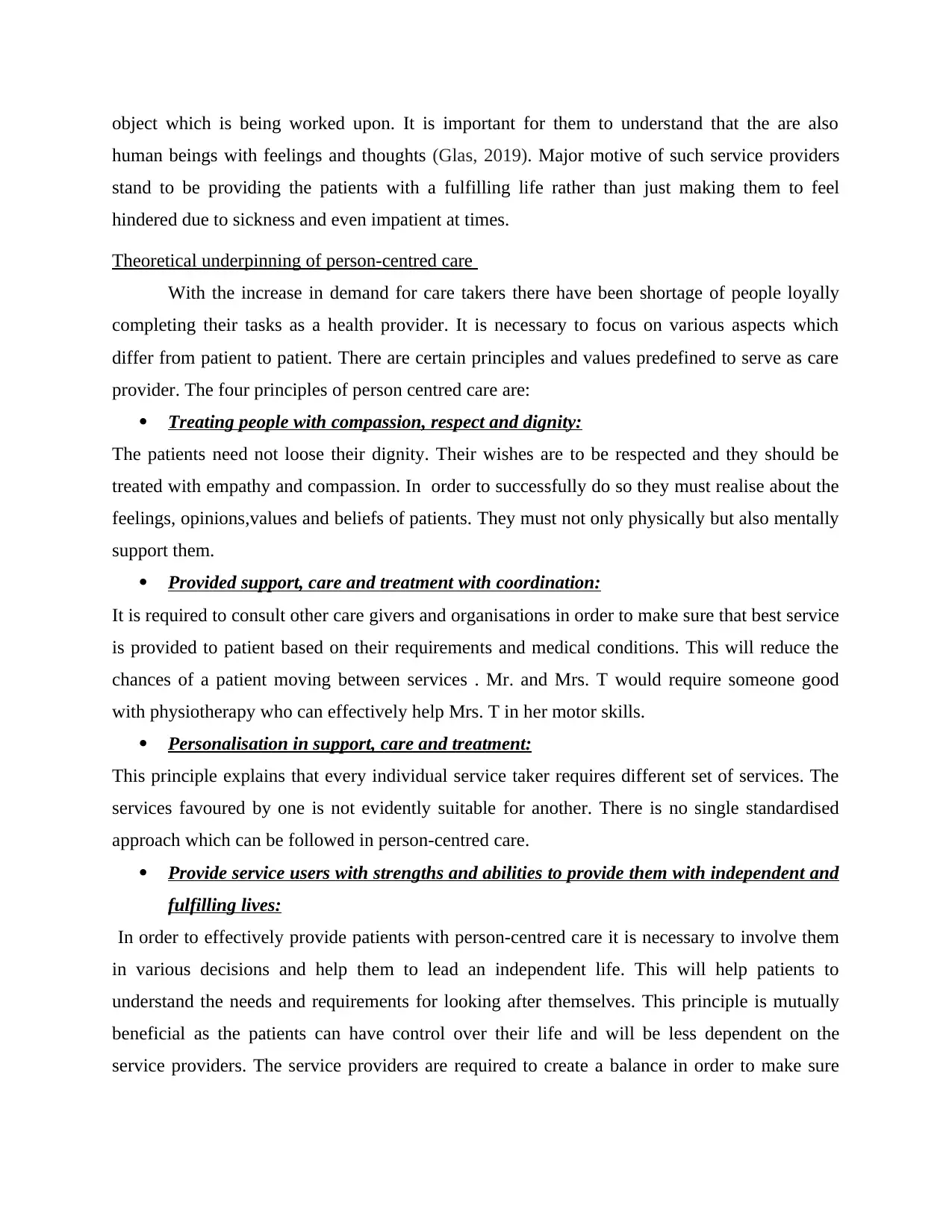
object which is being worked upon. It is important for them to understand that the are also
human beings with feelings and thoughts (Glas, 2019). Major motive of such service providers
stand to be providing the patients with a fulfilling life rather than just making them to feel
hindered due to sickness and even impatient at times.
Theoretical underpinning of person-centred care
With the increase in demand for care takers there have been shortage of people loyally
completing their tasks as a health provider. It is necessary to focus on various aspects which
differ from patient to patient. There are certain principles and values predefined to serve as care
provider. The four principles of person centred care are:
Treating people with compassion, respect and dignity:
The patients need not loose their dignity. Their wishes are to be respected and they should be
treated with empathy and compassion. In order to successfully do so they must realise about the
feelings, opinions,values and beliefs of patients. They must not only physically but also mentally
support them.
Provided support, care and treatment with coordination:
It is required to consult other care givers and organisations in order to make sure that best service
is provided to patient based on their requirements and medical conditions. This will reduce the
chances of a patient moving between services . Mr. and Mrs. T would require someone good
with physiotherapy who can effectively help Mrs. T in her motor skills.
Personalisation in support, care and treatment:
This principle explains that every individual service taker requires different set of services. The
services favoured by one is not evidently suitable for another. There is no single standardised
approach which can be followed in person-centred care.
Provide service users with strengths and abilities to provide them with independent and
fulfilling lives:
In order to effectively provide patients with person-centred care it is necessary to involve them
in various decisions and help them to lead an independent life. This will help patients to
understand the needs and requirements for looking after themselves. This principle is mutually
beneficial as the patients can have control over their life and will be less dependent on the
service providers. The service providers are required to create a balance in order to make sure
human beings with feelings and thoughts (Glas, 2019). Major motive of such service providers
stand to be providing the patients with a fulfilling life rather than just making them to feel
hindered due to sickness and even impatient at times.
Theoretical underpinning of person-centred care
With the increase in demand for care takers there have been shortage of people loyally
completing their tasks as a health provider. It is necessary to focus on various aspects which
differ from patient to patient. There are certain principles and values predefined to serve as care
provider. The four principles of person centred care are:
Treating people with compassion, respect and dignity:
The patients need not loose their dignity. Their wishes are to be respected and they should be
treated with empathy and compassion. In order to successfully do so they must realise about the
feelings, opinions,values and beliefs of patients. They must not only physically but also mentally
support them.
Provided support, care and treatment with coordination:
It is required to consult other care givers and organisations in order to make sure that best service
is provided to patient based on their requirements and medical conditions. This will reduce the
chances of a patient moving between services . Mr. and Mrs. T would require someone good
with physiotherapy who can effectively help Mrs. T in her motor skills.
Personalisation in support, care and treatment:
This principle explains that every individual service taker requires different set of services. The
services favoured by one is not evidently suitable for another. There is no single standardised
approach which can be followed in person-centred care.
Provide service users with strengths and abilities to provide them with independent and
fulfilling lives:
In order to effectively provide patients with person-centred care it is necessary to involve them
in various decisions and help them to lead an independent life. This will help patients to
understand the needs and requirements for looking after themselves. This principle is mutually
beneficial as the patients can have control over their life and will be less dependent on the
service providers. The service providers are required to create a balance in order to make sure
Paraphrase This Document
Need a fresh take? Get an instant paraphrase of this document with our AI Paraphraser
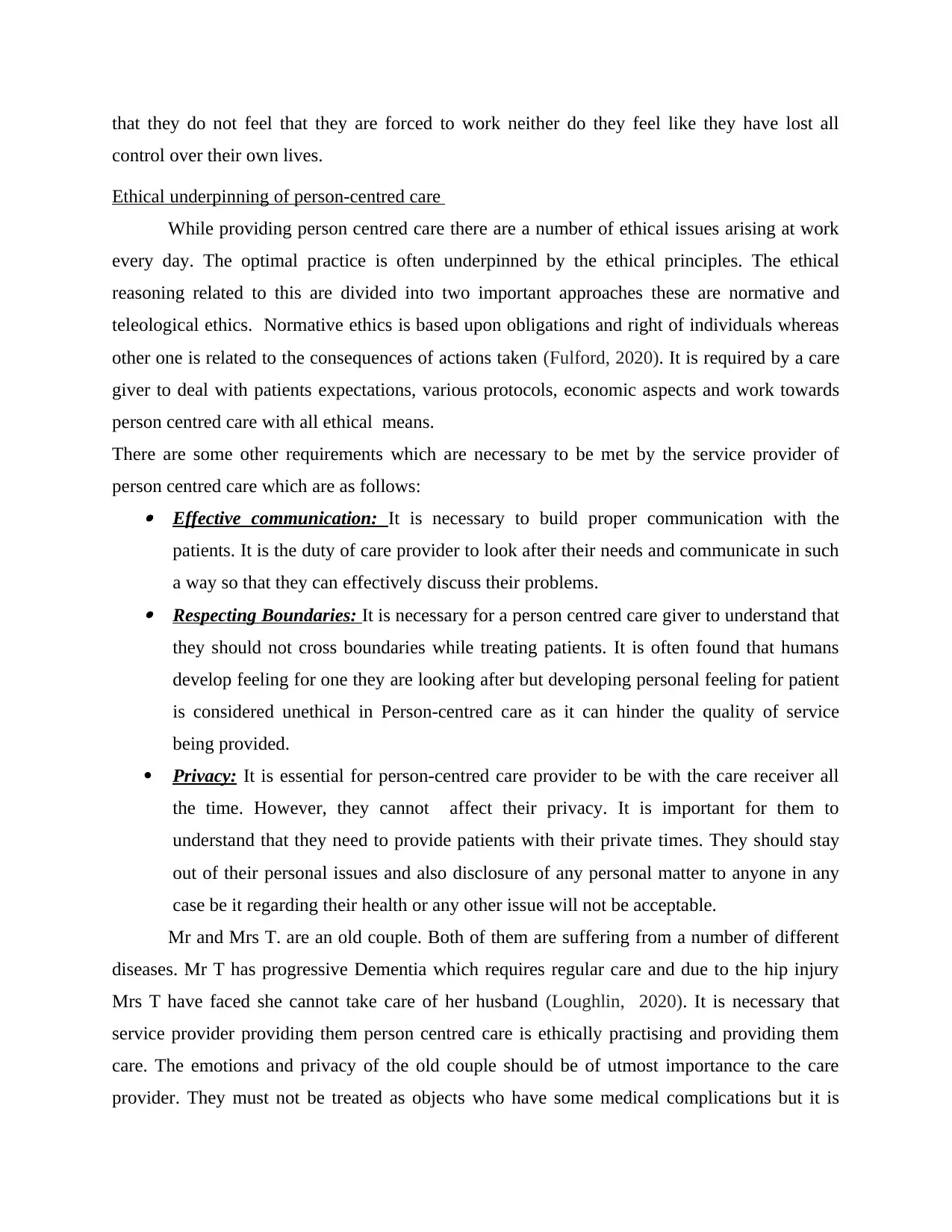
that they do not feel that they are forced to work neither do they feel like they have lost all
control over their own lives.
Ethical underpinning of person-centred care
While providing person centred care there are a number of ethical issues arising at work
every day. The optimal practice is often underpinned by the ethical principles. The ethical
reasoning related to this are divided into two important approaches these are normative and
teleological ethics. Normative ethics is based upon obligations and right of individuals whereas
other one is related to the consequences of actions taken (Fulford, 2020). It is required by a care
giver to deal with patients expectations, various protocols, economic aspects and work towards
person centred care with all ethical means.
There are some other requirements which are necessary to be met by the service provider of
person centred care which are as follows: Effective communication: It is necessary to build proper communication with the
patients. It is the duty of care provider to look after their needs and communicate in such
a way so that they can effectively discuss their problems. Respecting Boundaries: It is necessary for a person centred care giver to understand that
they should not cross boundaries while treating patients. It is often found that humans
develop feeling for one they are looking after but developing personal feeling for patient
is considered unethical in Person-centred care as it can hinder the quality of service
being provided.
Privacy: It is essential for person-centred care provider to be with the care receiver all
the time. However, they cannot affect their privacy. It is important for them to
understand that they need to provide patients with their private times. They should stay
out of their personal issues and also disclosure of any personal matter to anyone in any
case be it regarding their health or any other issue will not be acceptable.
Mr and Mrs T. are an old couple. Both of them are suffering from a number of different
diseases. Mr T has progressive Dementia which requires regular care and due to the hip injury
Mrs T have faced she cannot take care of her husband (Loughlin, 2020). It is necessary that
service provider providing them person centred care is ethically practising and providing them
care. The emotions and privacy of the old couple should be of utmost importance to the care
provider. They must not be treated as objects who have some medical complications but it is
control over their own lives.
Ethical underpinning of person-centred care
While providing person centred care there are a number of ethical issues arising at work
every day. The optimal practice is often underpinned by the ethical principles. The ethical
reasoning related to this are divided into two important approaches these are normative and
teleological ethics. Normative ethics is based upon obligations and right of individuals whereas
other one is related to the consequences of actions taken (Fulford, 2020). It is required by a care
giver to deal with patients expectations, various protocols, economic aspects and work towards
person centred care with all ethical means.
There are some other requirements which are necessary to be met by the service provider of
person centred care which are as follows: Effective communication: It is necessary to build proper communication with the
patients. It is the duty of care provider to look after their needs and communicate in such
a way so that they can effectively discuss their problems. Respecting Boundaries: It is necessary for a person centred care giver to understand that
they should not cross boundaries while treating patients. It is often found that humans
develop feeling for one they are looking after but developing personal feeling for patient
is considered unethical in Person-centred care as it can hinder the quality of service
being provided.
Privacy: It is essential for person-centred care provider to be with the care receiver all
the time. However, they cannot affect their privacy. It is important for them to
understand that they need to provide patients with their private times. They should stay
out of their personal issues and also disclosure of any personal matter to anyone in any
case be it regarding their health or any other issue will not be acceptable.
Mr and Mrs T. are an old couple. Both of them are suffering from a number of different
diseases. Mr T has progressive Dementia which requires regular care and due to the hip injury
Mrs T have faced she cannot take care of her husband (Loughlin, 2020). It is necessary that
service provider providing them person centred care is ethically practising and providing them
care. The emotions and privacy of the old couple should be of utmost importance to the care
provider. They must not be treated as objects who have some medical complications but it is
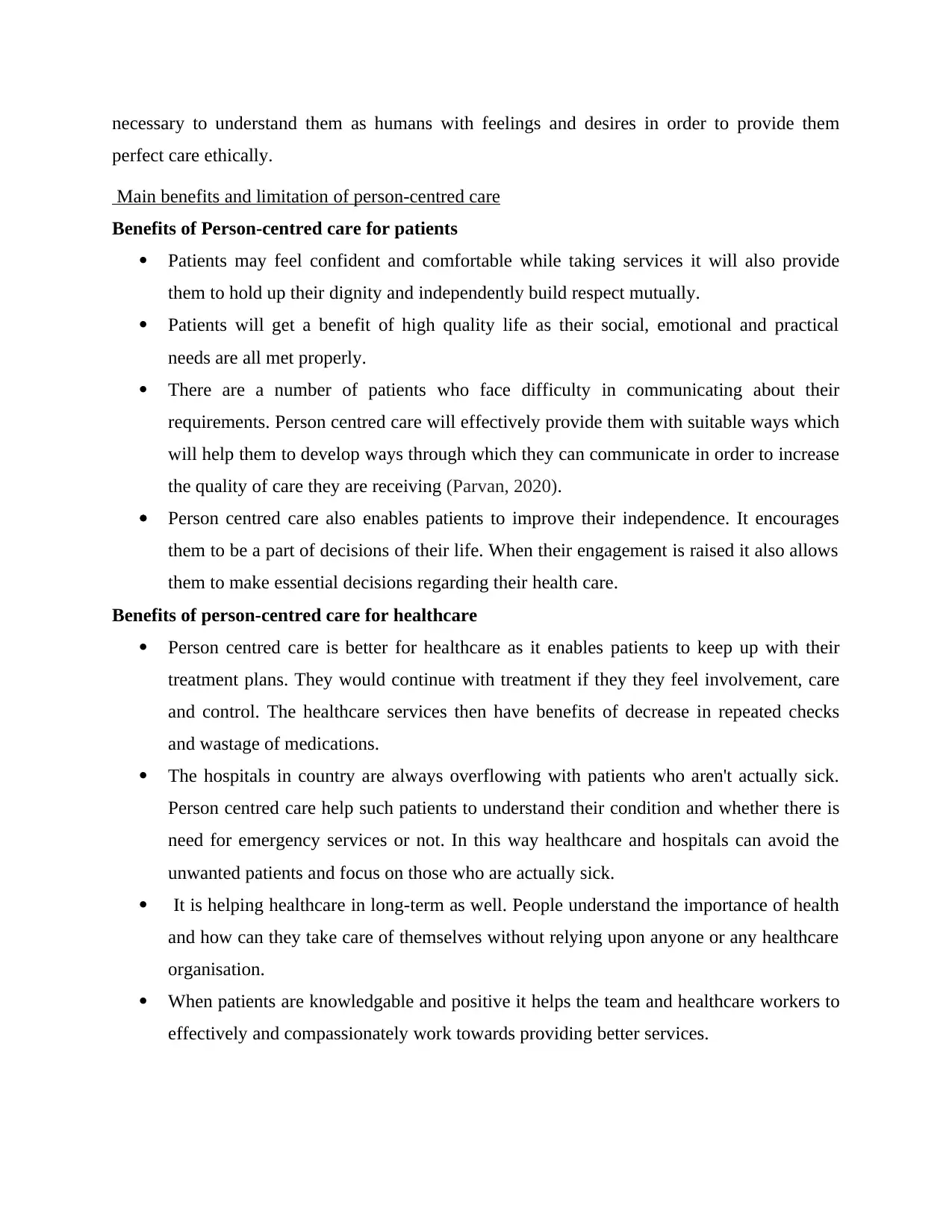
necessary to understand them as humans with feelings and desires in order to provide them
perfect care ethically.
Main benefits and limitation of person-centred care
Benefits of Person-centred care for patients
Patients may feel confident and comfortable while taking services it will also provide
them to hold up their dignity and independently build respect mutually.
Patients will get a benefit of high quality life as their social, emotional and practical
needs are all met properly.
There are a number of patients who face difficulty in communicating about their
requirements. Person centred care will effectively provide them with suitable ways which
will help them to develop ways through which they can communicate in order to increase
the quality of care they are receiving (Parvan, 2020).
Person centred care also enables patients to improve their independence. It encourages
them to be a part of decisions of their life. When their engagement is raised it also allows
them to make essential decisions regarding their health care.
Benefits of person-centred care for healthcare
Person centred care is better for healthcare as it enables patients to keep up with their
treatment plans. They would continue with treatment if they they feel involvement, care
and control. The healthcare services then have benefits of decrease in repeated checks
and wastage of medications.
The hospitals in country are always overflowing with patients who aren't actually sick.
Person centred care help such patients to understand their condition and whether there is
need for emergency services or not. In this way healthcare and hospitals can avoid the
unwanted patients and focus on those who are actually sick.
It is helping healthcare in long-term as well. People understand the importance of health
and how can they take care of themselves without relying upon anyone or any healthcare
organisation.
When patients are knowledgable and positive it helps the team and healthcare workers to
effectively and compassionately work towards providing better services.
perfect care ethically.
Main benefits and limitation of person-centred care
Benefits of Person-centred care for patients
Patients may feel confident and comfortable while taking services it will also provide
them to hold up their dignity and independently build respect mutually.
Patients will get a benefit of high quality life as their social, emotional and practical
needs are all met properly.
There are a number of patients who face difficulty in communicating about their
requirements. Person centred care will effectively provide them with suitable ways which
will help them to develop ways through which they can communicate in order to increase
the quality of care they are receiving (Parvan, 2020).
Person centred care also enables patients to improve their independence. It encourages
them to be a part of decisions of their life. When their engagement is raised it also allows
them to make essential decisions regarding their health care.
Benefits of person-centred care for healthcare
Person centred care is better for healthcare as it enables patients to keep up with their
treatment plans. They would continue with treatment if they they feel involvement, care
and control. The healthcare services then have benefits of decrease in repeated checks
and wastage of medications.
The hospitals in country are always overflowing with patients who aren't actually sick.
Person centred care help such patients to understand their condition and whether there is
need for emergency services or not. In this way healthcare and hospitals can avoid the
unwanted patients and focus on those who are actually sick.
It is helping healthcare in long-term as well. People understand the importance of health
and how can they take care of themselves without relying upon anyone or any healthcare
organisation.
When patients are knowledgable and positive it helps the team and healthcare workers to
effectively and compassionately work towards providing better services.
⊘ This is a preview!⊘
Do you want full access?
Subscribe today to unlock all pages.

Trusted by 1+ million students worldwide
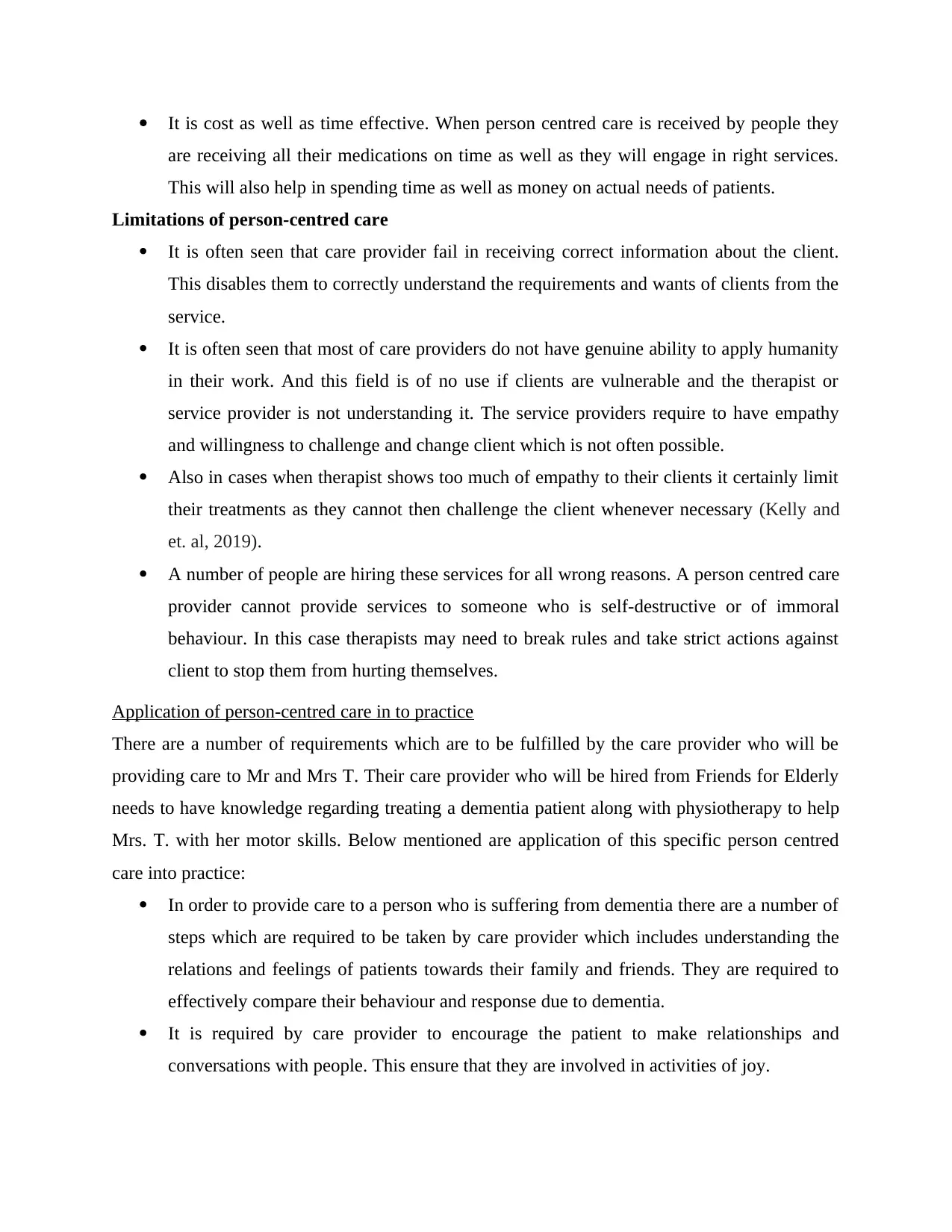
It is cost as well as time effective. When person centred care is received by people they
are receiving all their medications on time as well as they will engage in right services.
This will also help in spending time as well as money on actual needs of patients.
Limitations of person-centred care
It is often seen that care provider fail in receiving correct information about the client.
This disables them to correctly understand the requirements and wants of clients from the
service.
It is often seen that most of care providers do not have genuine ability to apply humanity
in their work. And this field is of no use if clients are vulnerable and the therapist or
service provider is not understanding it. The service providers require to have empathy
and willingness to challenge and change client which is not often possible.
Also in cases when therapist shows too much of empathy to their clients it certainly limit
their treatments as they cannot then challenge the client whenever necessary (Kelly and
et. al, 2019).
A number of people are hiring these services for all wrong reasons. A person centred care
provider cannot provide services to someone who is self-destructive or of immoral
behaviour. In this case therapists may need to break rules and take strict actions against
client to stop them from hurting themselves.
Application of person-centred care in to practice
There are a number of requirements which are to be fulfilled by the care provider who will be
providing care to Mr and Mrs T. Their care provider who will be hired from Friends for Elderly
needs to have knowledge regarding treating a dementia patient along with physiotherapy to help
Mrs. T. with her motor skills. Below mentioned are application of this specific person centred
care into practice:
In order to provide care to a person who is suffering from dementia there are a number of
steps which are required to be taken by care provider which includes understanding the
relations and feelings of patients towards their family and friends. They are required to
effectively compare their behaviour and response due to dementia.
It is required by care provider to encourage the patient to make relationships and
conversations with people. This ensure that they are involved in activities of joy.
are receiving all their medications on time as well as they will engage in right services.
This will also help in spending time as well as money on actual needs of patients.
Limitations of person-centred care
It is often seen that care provider fail in receiving correct information about the client.
This disables them to correctly understand the requirements and wants of clients from the
service.
It is often seen that most of care providers do not have genuine ability to apply humanity
in their work. And this field is of no use if clients are vulnerable and the therapist or
service provider is not understanding it. The service providers require to have empathy
and willingness to challenge and change client which is not often possible.
Also in cases when therapist shows too much of empathy to their clients it certainly limit
their treatments as they cannot then challenge the client whenever necessary (Kelly and
et. al, 2019).
A number of people are hiring these services for all wrong reasons. A person centred care
provider cannot provide services to someone who is self-destructive or of immoral
behaviour. In this case therapists may need to break rules and take strict actions against
client to stop them from hurting themselves.
Application of person-centred care in to practice
There are a number of requirements which are to be fulfilled by the care provider who will be
providing care to Mr and Mrs T. Their care provider who will be hired from Friends for Elderly
needs to have knowledge regarding treating a dementia patient along with physiotherapy to help
Mrs. T. with her motor skills. Below mentioned are application of this specific person centred
care into practice:
In order to provide care to a person who is suffering from dementia there are a number of
steps which are required to be taken by care provider which includes understanding the
relations and feelings of patients towards their family and friends. They are required to
effectively compare their behaviour and response due to dementia.
It is required by care provider to encourage the patient to make relationships and
conversations with people. This ensure that they are involved in activities of joy.
Paraphrase This Document
Need a fresh take? Get an instant paraphrase of this document with our AI Paraphraser
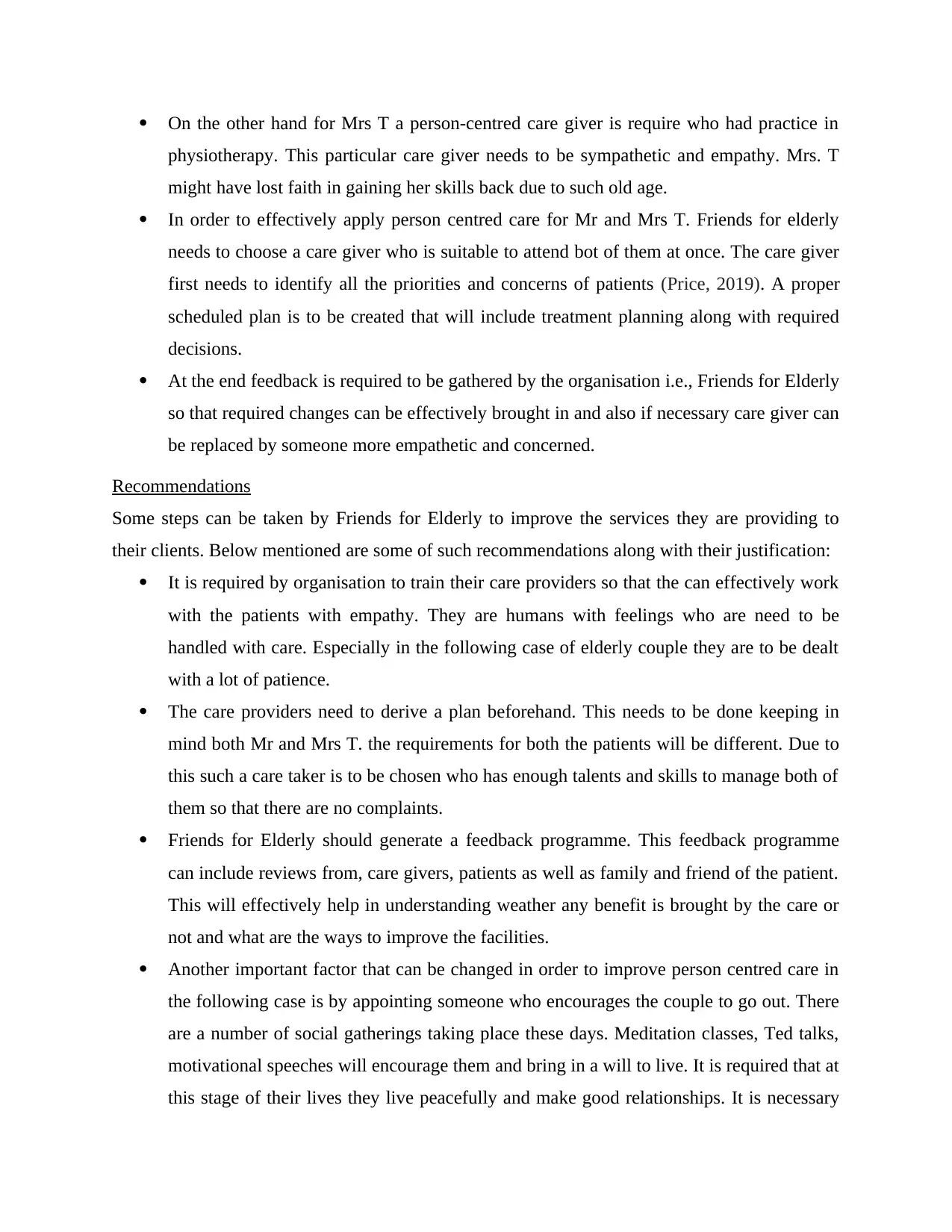
On the other hand for Mrs T a person-centred care giver is require who had practice in
physiotherapy. This particular care giver needs to be sympathetic and empathy. Mrs. T
might have lost faith in gaining her skills back due to such old age.
In order to effectively apply person centred care for Mr and Mrs T. Friends for elderly
needs to choose a care giver who is suitable to attend bot of them at once. The care giver
first needs to identify all the priorities and concerns of patients (Price, 2019). A proper
scheduled plan is to be created that will include treatment planning along with required
decisions.
At the end feedback is required to be gathered by the organisation i.e., Friends for Elderly
so that required changes can be effectively brought in and also if necessary care giver can
be replaced by someone more empathetic and concerned.
Recommendations
Some steps can be taken by Friends for Elderly to improve the services they are providing to
their clients. Below mentioned are some of such recommendations along with their justification:
It is required by organisation to train their care providers so that the can effectively work
with the patients with empathy. They are humans with feelings who are need to be
handled with care. Especially in the following case of elderly couple they are to be dealt
with a lot of patience.
The care providers need to derive a plan beforehand. This needs to be done keeping in
mind both Mr and Mrs T. the requirements for both the patients will be different. Due to
this such a care taker is to be chosen who has enough talents and skills to manage both of
them so that there are no complaints.
Friends for Elderly should generate a feedback programme. This feedback programme
can include reviews from, care givers, patients as well as family and friend of the patient.
This will effectively help in understanding weather any benefit is brought by the care or
not and what are the ways to improve the facilities.
Another important factor that can be changed in order to improve person centred care in
the following case is by appointing someone who encourages the couple to go out. There
are a number of social gatherings taking place these days. Meditation classes, Ted talks,
motivational speeches will encourage them and bring in a will to live. It is required that at
this stage of their lives they live peacefully and make good relationships. It is necessary
physiotherapy. This particular care giver needs to be sympathetic and empathy. Mrs. T
might have lost faith in gaining her skills back due to such old age.
In order to effectively apply person centred care for Mr and Mrs T. Friends for elderly
needs to choose a care giver who is suitable to attend bot of them at once. The care giver
first needs to identify all the priorities and concerns of patients (Price, 2019). A proper
scheduled plan is to be created that will include treatment planning along with required
decisions.
At the end feedback is required to be gathered by the organisation i.e., Friends for Elderly
so that required changes can be effectively brought in and also if necessary care giver can
be replaced by someone more empathetic and concerned.
Recommendations
Some steps can be taken by Friends for Elderly to improve the services they are providing to
their clients. Below mentioned are some of such recommendations along with their justification:
It is required by organisation to train their care providers so that the can effectively work
with the patients with empathy. They are humans with feelings who are need to be
handled with care. Especially in the following case of elderly couple they are to be dealt
with a lot of patience.
The care providers need to derive a plan beforehand. This needs to be done keeping in
mind both Mr and Mrs T. the requirements for both the patients will be different. Due to
this such a care taker is to be chosen who has enough talents and skills to manage both of
them so that there are no complaints.
Friends for Elderly should generate a feedback programme. This feedback programme
can include reviews from, care givers, patients as well as family and friend of the patient.
This will effectively help in understanding weather any benefit is brought by the care or
not and what are the ways to improve the facilities.
Another important factor that can be changed in order to improve person centred care in
the following case is by appointing someone who encourages the couple to go out. There
are a number of social gatherings taking place these days. Meditation classes, Ted talks,
motivational speeches will encourage them and bring in a will to live. It is required that at
this stage of their lives they live peacefully and make good relationships. It is necessary
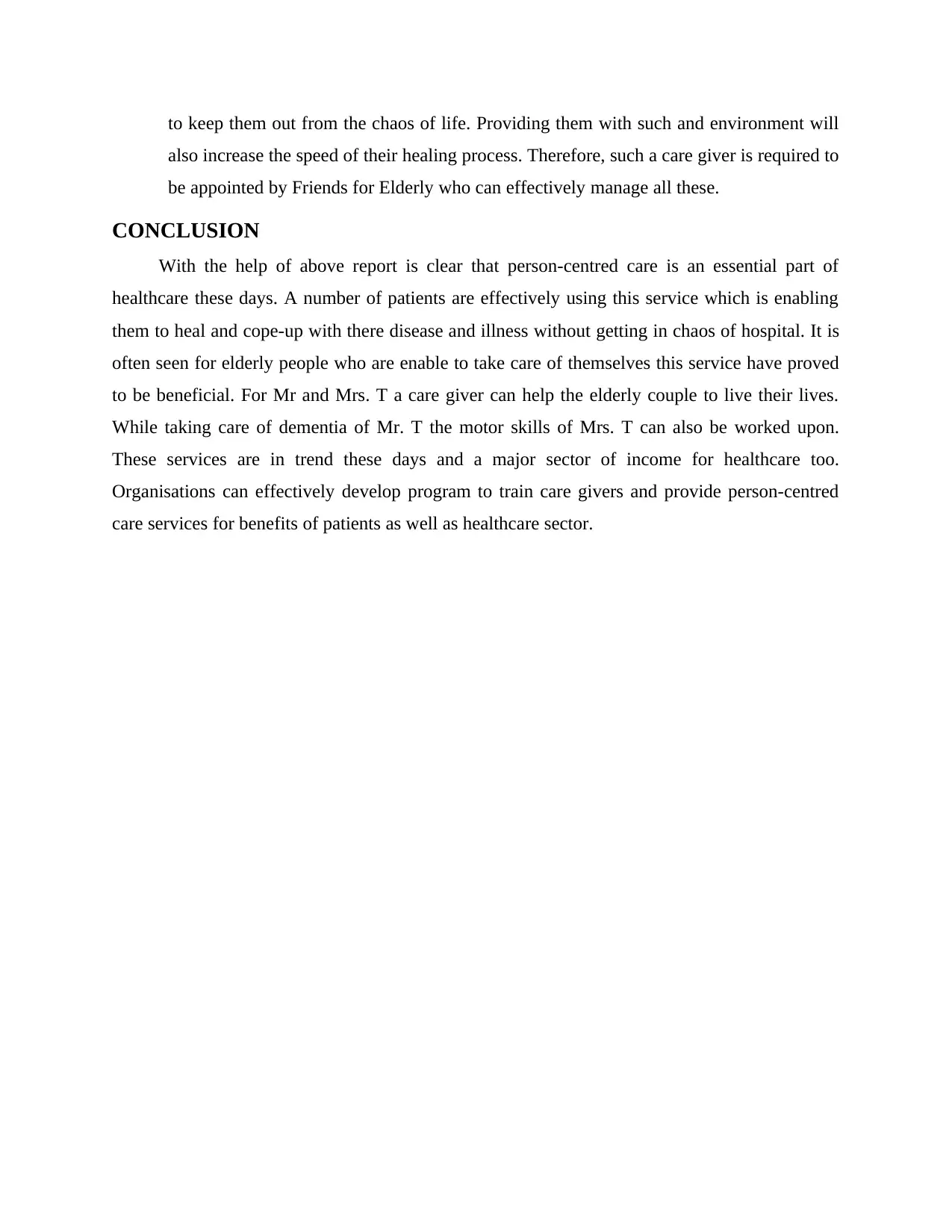
to keep them out from the chaos of life. Providing them with such and environment will
also increase the speed of their healing process. Therefore, such a care giver is required to
be appointed by Friends for Elderly who can effectively manage all these.
CONCLUSION
With the help of above report is clear that person-centred care is an essential part of
healthcare these days. A number of patients are effectively using this service which is enabling
them to heal and cope-up with there disease and illness without getting in chaos of hospital. It is
often seen for elderly people who are enable to take care of themselves this service have proved
to be beneficial. For Mr and Mrs. T a care giver can help the elderly couple to live their lives.
While taking care of dementia of Mr. T the motor skills of Mrs. T can also be worked upon.
These services are in trend these days and a major sector of income for healthcare too.
Organisations can effectively develop program to train care givers and provide person-centred
care services for benefits of patients as well as healthcare sector.
also increase the speed of their healing process. Therefore, such a care giver is required to
be appointed by Friends for Elderly who can effectively manage all these.
CONCLUSION
With the help of above report is clear that person-centred care is an essential part of
healthcare these days. A number of patients are effectively using this service which is enabling
them to heal and cope-up with there disease and illness without getting in chaos of hospital. It is
often seen for elderly people who are enable to take care of themselves this service have proved
to be beneficial. For Mr and Mrs. T a care giver can help the elderly couple to live their lives.
While taking care of dementia of Mr. T the motor skills of Mrs. T can also be worked upon.
These services are in trend these days and a major sector of income for healthcare too.
Organisations can effectively develop program to train care givers and provide person-centred
care services for benefits of patients as well as healthcare sector.
⊘ This is a preview!⊘
Do you want full access?
Subscribe today to unlock all pages.

Trusted by 1+ million students worldwide
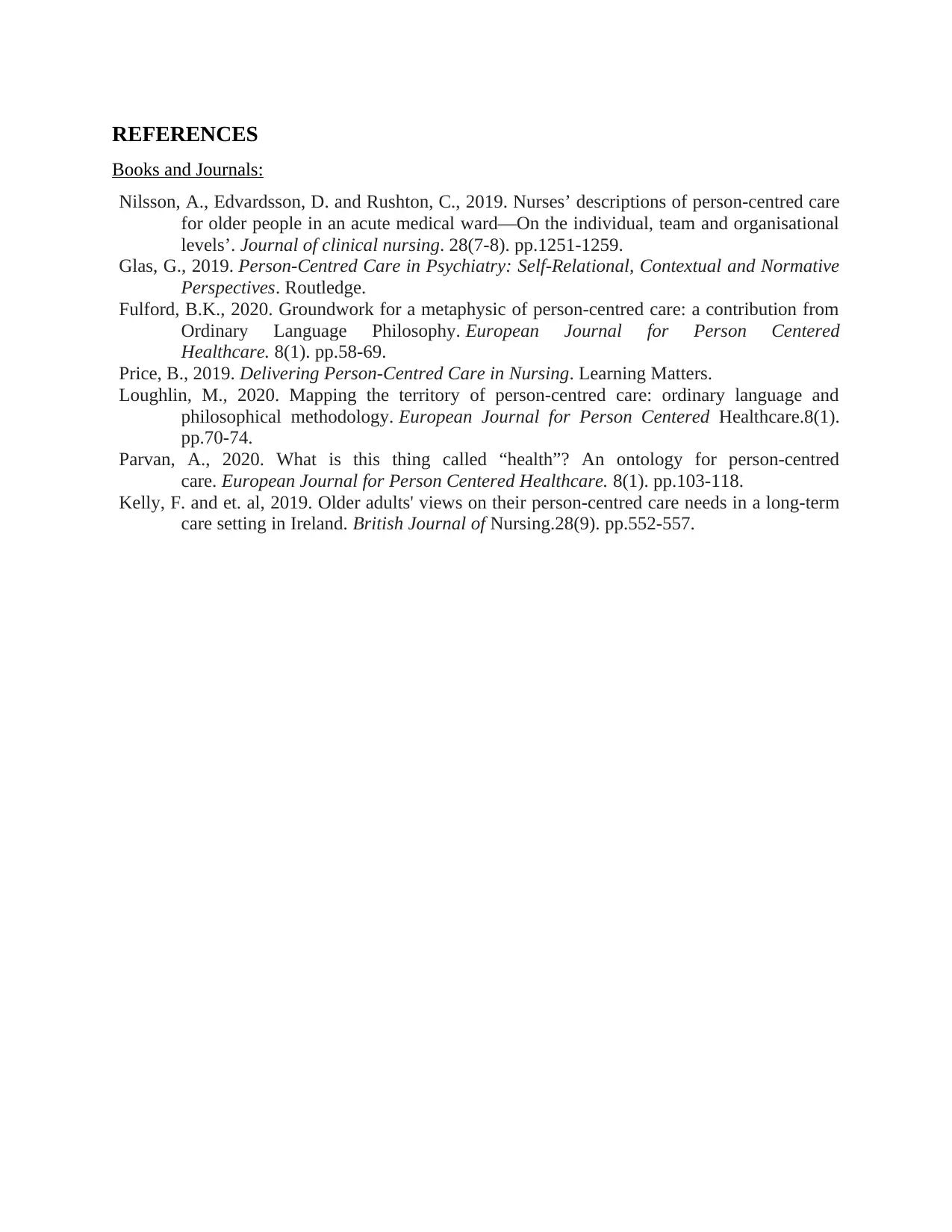
REFERENCES
Books and Journals:
Nilsson, A., Edvardsson, D. and Rushton, C., 2019. Nurses’ descriptions of person‐centred care
for older people in an acute medical ward—On the individual, team and organisational
levels’. Journal of clinical nursing. 28(7-8). pp.1251-1259.
Glas, G., 2019. Person-Centred Care in Psychiatry: Self-Relational, Contextual and Normative
Perspectives. Routledge.
Fulford, B.K., 2020. Groundwork for a metaphysic of person-centred care: a contribution from
Ordinary Language Philosophy. European Journal for Person Centered
Healthcare. 8(1). pp.58-69.
Price, B., 2019. Delivering Person-Centred Care in Nursing. Learning Matters.
Loughlin, M., 2020. Mapping the territory of person-centred care: ordinary language and
philosophical methodology. European Journal for Person Centered Healthcare.8(1).
pp.70-74.
Parvan, A., 2020. What is this thing called “health”? An ontology for person-centred
care. European Journal for Person Centered Healthcare. 8(1). pp.103-118.
Kelly, F. and et. al, 2019. Older adults' views on their person-centred care needs in a long-term
care setting in Ireland. British Journal of Nursing.28(9). pp.552-557.
Books and Journals:
Nilsson, A., Edvardsson, D. and Rushton, C., 2019. Nurses’ descriptions of person‐centred care
for older people in an acute medical ward—On the individual, team and organisational
levels’. Journal of clinical nursing. 28(7-8). pp.1251-1259.
Glas, G., 2019. Person-Centred Care in Psychiatry: Self-Relational, Contextual and Normative
Perspectives. Routledge.
Fulford, B.K., 2020. Groundwork for a metaphysic of person-centred care: a contribution from
Ordinary Language Philosophy. European Journal for Person Centered
Healthcare. 8(1). pp.58-69.
Price, B., 2019. Delivering Person-Centred Care in Nursing. Learning Matters.
Loughlin, M., 2020. Mapping the territory of person-centred care: ordinary language and
philosophical methodology. European Journal for Person Centered Healthcare.8(1).
pp.70-74.
Parvan, A., 2020. What is this thing called “health”? An ontology for person-centred
care. European Journal for Person Centered Healthcare. 8(1). pp.103-118.
Kelly, F. and et. al, 2019. Older adults' views on their person-centred care needs in a long-term
care setting in Ireland. British Journal of Nursing.28(9). pp.552-557.
1 out of 10
Related Documents
Your All-in-One AI-Powered Toolkit for Academic Success.
+13062052269
info@desklib.com
Available 24*7 on WhatsApp / Email
![[object Object]](/_next/static/media/star-bottom.7253800d.svg)
Unlock your academic potential
Copyright © 2020–2026 A2Z Services. All Rights Reserved. Developed and managed by ZUCOL.





